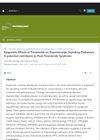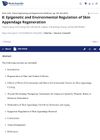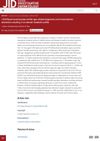Search
for
Sort by
Research
990-1000 / 1000+ results
research Epigenetic Effects of Finasteride on Dopaminergic Signaling Pathways: A Potential Contributor to Post-Finasteride Syndrome
Finasteride may cause changes in dopamine-related genes, possibly leading to post-finasteride syndrome.

research Epigenetic and Environmental Regulation of Skin Appendage Regeneration
Both changes in genes and environmental factors like diet and toxins can significantly affect the growth of skin appendages like hair, but how these factors interact is still unclear.
research Epigenetic Effects of Finasteride on Human Leydig Cells
Finasteride may cause lasting sexual issues by altering specific genes in human cells.

research Stepwise Acquisition of Unique Epigenetic Signatures During Differentiation of Tissue Treg Cells
Tissue environment greatly affects the unique epigenetic makeup of regulatory T cells, which could impact autoimmune disease treatment.
research Finasteride Induces Epigenetic Modulation of LSP1: A Gene Implicated in Neutrophil Actin Dysfunction Disease
Finasteride may help treat Neutrophil Actin Dysfunction by reducing LSP1 gene activity.

research The Agouti Mouse Model: An Epigenetic Biosensor for Nutritional and Environmental Alterations on the Fetal Epigenome
Diet changes can protect against harmful environmental effects on fetal development.

research Basal Keratinocytes Exhibit Age-Related Epigenetic and Transcriptomic Alterations Resulting in an Altered Metabolic Profile
Aging changes skin cells, leading to different DNA methylation and gene activity, affecting cell metabolism and aging signs.

research Dynamic Morphogen-p63 Chromatin Interactions That Guide Epigenetic Changes and p63 Activity in Surface Ectoderm Commitment
The study found that p63 needs signals from morphogens to help skin cells differentiate properly.

research Failures of DNA Methylation Clocks and Development of a Noise Barometer for Measuring Epigenetic Pressure of Aging and Disease
Elastic Net DNA methylation clocks are inaccurate for predicting age and health status; a "noise barometer" may better indicate aging and disease.